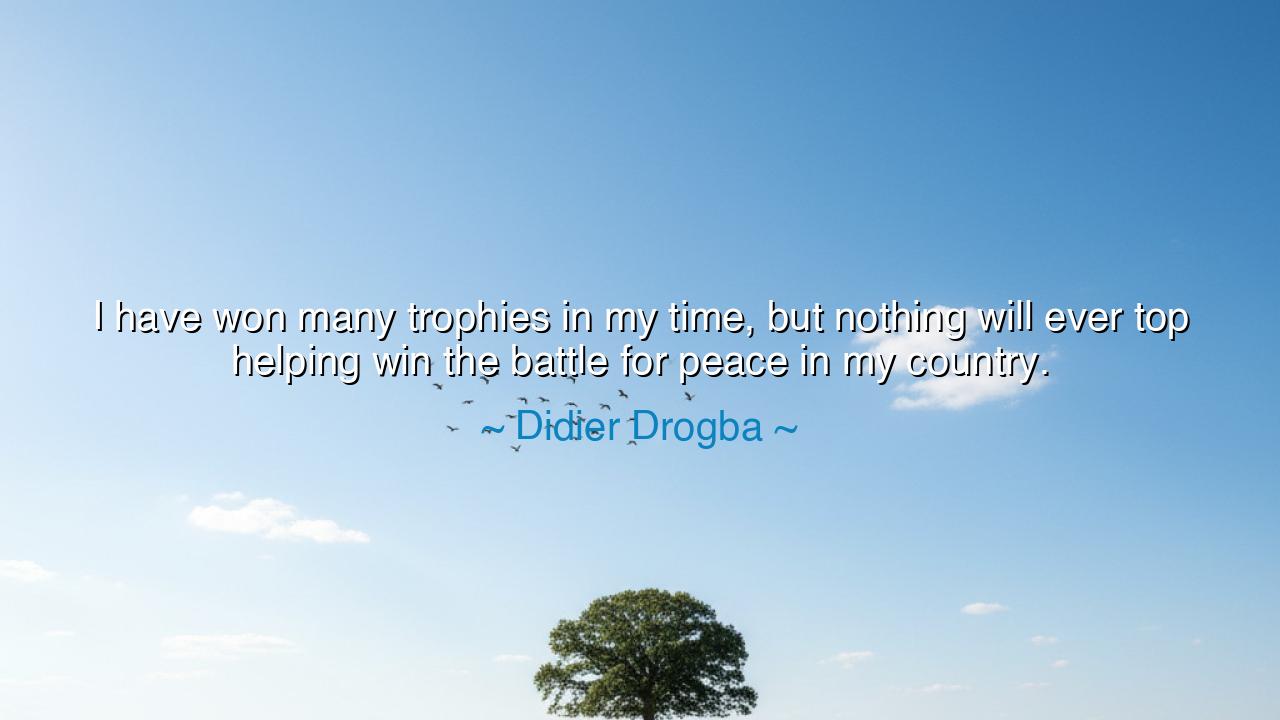
I have won many trophies in my time, but nothing will ever top
I have won many trophies in my time, but nothing will ever top helping win the battle for peace in my country.






Hear the voice of the warrior of the field, Didier Drogba, who declared: “I have won many trophies in my time, but nothing will ever top helping win the battle for peace in my country.” These words come not from the triumph of stadiums, nor from the glory of medals, but from a deeper, eternal truth: that the greatest victory a man can achieve is not measured in silver or gold, but in the healing of his people and the restoration of harmony where there was once bloodshed.
For trophies are the symbols of individual greatness, earned by strength, skill, and discipline. They shine brightly, yet their brilliance fades with time, forgotten in the endless cycle of contests. But the work of securing peace is eternal, for it rescues lives, heals generations, and shapes the destiny of nations. Drogba understood this: that though his name was already carved in football’s history, his truest legacy would be written not on the pitch, but in the hearts of his countrymen.
The origin of his words lies in the turmoil of his homeland, Ivory Coast, a nation torn by civil war. In 2005, after leading his team to qualify for the World Cup, Drogba fell to his knees before cameras and begged his people to lay down their arms. He pleaded with rebels and government alike, saying that they must end the fighting. His message, born from the unity of sport and the power of voice, struck deep. Within a week, the warring sides declared a ceasefire. What no army could achieve, the cry of one man for peace began to accomplish.
This is not new in history. Recall the story of King Ashoka of India, who after the bloody battle of Kalinga, looked upon the field of corpses and was sickened by the cost of conquest. He abandoned war and became a champion of Buddhism, spreading compassion and nonviolence throughout his realm. Like Drogba, he discovered that the truest victory is not domination of others, but the reconciliation of a divided people. His legacy endures not because of his conquests, but because he turned from conquest to peace.
Drogba’s words reveal also the humility of wisdom. He had already risen to the heights of football, winning titles in England and abroad, yet he knew these triumphs were but echoes compared to the stillness that follows when war is silenced. He understood that to stop bloodshed is greater than to score goals, that to save a child from war is a prize beyond measure. This is why he proclaimed that nothing could “top” the battle for peace—for all human striving is empty if peace is lost.
O children of tomorrow, learn from this teaching: do not measure greatness only by what is won for yourself, but by what is secured for others. Seek not only victories that bring you honor, but victories that bring life and healing to those around you. Ask not only how you may rise, but how you may lift others from suffering. For the truest trophy is the gratitude of a people, and the most enduring medal is the peace you leave behind.
Thus the words of Didier Drogba echo like a trumpet of truth: trophies fade, but peace endures. Let this be your guiding principle—whether in your family, your community, or your nation. Strive for excellence, yes, but greater still, strive for peace. For in the end, it is not the victories carved in stone that matter, but the lives you have healed, the harmony you have restored, and the legacy of hope you have left to the world.






AAdministratorAdministrator
Welcome, honored guests. Please leave a comment, we will respond soon